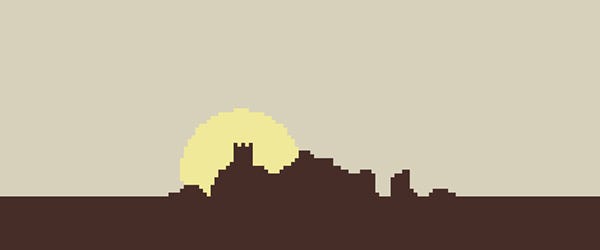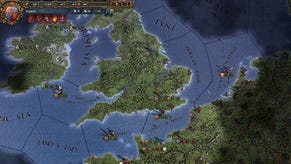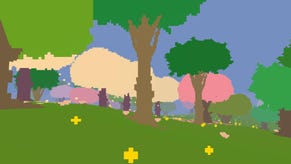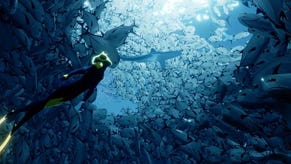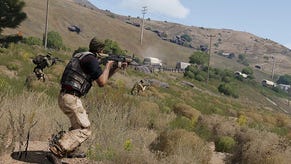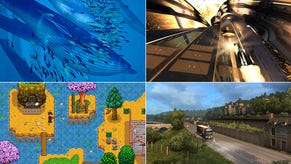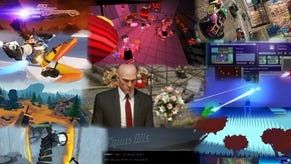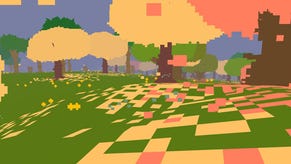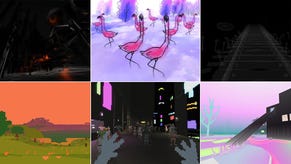Level With Me, Ed Key
Too afraid to touch Terry
“Level with Me” is a series of conversations about level design between modder Robert Yang and a level designer of a first person game. At the end of each interview, they collaborate on a Portal 2 level shared across all the sessions – and at the very end of the series, you’ll get to download and play this “roundtable level.” This is Part 6 of 7.
Ed Key worked for 8 or 9 years in the game industry, then took a slightly less exciting software engineering job and moved out to the countryside. When he isn't wandering through sweeping vistas, he's collaborating with musician David Kanaga on his first official indie game: Proteus, “a game of pure exploration and discovery.”
Robert Yang: When I was playing Proteus, I found myself lulled into a weird hypnotic sleep, as I closed my eyes and started navigating solely by sound. I can't explain it. How did people play this at Indiecade?
Ed Key: The most rewarding moments were watching little kids playing it. They'd just play for half an hour, completely unselfconsciously. But in general it was quite a polarizing thing. Some people will just take a look at it, and some will sit down and play for 15 minutes, which is a pretty long time in an exhibition context.
RY: I feel weird about playing those games in public. I was too afraid to touch Terry [Cavanagh's] game, At A Distance, because there were 20 people surrounding the booth and if I played poorly I'd be misrepresenting the vision.
EK: Yeah, I tried playing it at Indiecade but the person I was playing with was very quiet, and he refused to engage me at all. So I just gave up.
RY: People will watch you play and think, “this game is broken.”
EK: Oh yeah, I went off to tell Terry it was broken, but by the time I came back, different people were on the game, and they had solved the problem.
RY: To go back to Proteus – a lot of people think of sound as just another game component, like physics and AI, and it's not usually elevated to the prominence of "narrative" – but you do it here. It's a bit like Sword and Sworcery like that.
EK: I haven't played Sword and Sworcery, but I really liked the look and idea of it. (I don't have an iPhone...)
RY: Wait, you haven't played it? Ah, there goes one question.
EK: [laughs] But I did talk to Kris Piotrowski (one of the devs behind Sword and Sworcery) after his session at Indiecade, and we were just kind of going, “yeah, that's exactly it!” I guess it was a great clicking moment.
RY: The sounds were incredibly iconic. [mimics some of the sounds] And that happens in Proteus, like when I was drifting blindly I could hear the rain in the distance, and those singing mushrooms that hide when you get close. How do you design something like that?
EK: With what you were talking about with the music, a lot of it came down to the collaboration with David [Kanaga]. There was a point in the project when I didn't really know what I was going to do with it. The name has nothing to do with the game – “Proteus” (the Greek god) refers to the development, the personification of shape-shifting.
Originally it was going to be a survival game, a shipwreck game, a Morrowind but more sandboxy with non-linear bits in it. I had used a Brian Eno piece for the original trailer and got in touch with David who had similar music. It turned out David was interested in dynamically mixed / composed sound, these playful interactive composition structures. It became a big focus for the game. It turned out we didn't really need anything else apart from that. So now we've had this iterative process of going back and forth, creating visuals and interactions for the sounds, and other sounds to go with it.
RY: Wait... are there seasons in this build I played?
EK: [probably taken aback by stupidity of question] Yeah.
RY: Oh god. I couldn't find them.
EK: [laughs] I should do some extra work for the IGF build, maybe. At Indiecade, we'd watch people playing, not finding the seasons, but they still seemed happy to wander around. So maybe I should just make summer more lively.
RY: Yeah, there was still plenty for me to do. I was astounded by the rain clouds – when you're at the highest point of the island, you're actually just inside the cloud, above the rain. Moving around is so strange in general, I think you've described it before as “nonspecific dream-like drifting.”
EK: Particularly with the introductory sequence, the idea is that this island is a dream, almost as if you're drawn to it. We thought about stuff like footstep sounds, but decided it wasn't important. Instead of a head bob, the camera just bobs around a bit on its own. You might've noticed it.
RY: I did notice that. I loved it. You stand still, but everything is moving a little.
EK: That was important to me, to prevent it from being a static screenshot even when nothing's happening.
RY: Even standing still becomes an activity. It's a weird kind of Taoist thing, to act by not acting.
EK: It is kind of a minimal action... I don't know, maybe it's something about the immersion too? I'm not sure I can quite put it into words.
RY: Those are the best kinds of things. Like, I have no idea who the player character is. Is this a dream? Is this a myth? Because in first person games, player movement defines character and allow me to role-play a little as someone else.
EK: Yes, that's one of the main differences between a human first person shooter, and, say, a mech first person shooter. The heavy feeling, the heavy footsteps kind of tell you it's a mech.
Summer in Proteus is interesting because there's a drum pattern in the background, and another pattern when you're moving – which isn't in Spring, which I guess is sort of the only concession to footstep sounds – this extra trip-hoppy drums that maybe adds a bit of energy to the soundscape when you're moving. Maybe it's our equivalent of footsteps.
RY: Is click-to-move working for you?
EK: Before Indiecade, I already had support for a 360 pad, and that's how most people played it. I think the pad is my preferred way of playing it, it seems more analog / softer and you can just sit back. I don't use click-to-move much, personally, but strafing does seem unnecessary. I did have an interesting conversation with Bennett [Foddy, creator of QWOP and GIRP] about whether to have some kind of more physical form of movement, like alternating mouse buttons or tapping keys to move, but I couldn't get it working to my satisfaction and it felt like too much work for the player.
At one point in development, you could press shift to run. It was interesting to watch people running everywhere, but also frustrating to watch them play it at that rhythm. If you can run, you feel like you have to go somewhere. I guess these are all FPS staples that I can get rid of? If you don't have to do any running or shooting or platforming, you can strip out some of those things.
RY: Yes, this game is about walking. With running... I think only children run without purpose.
EK: Yeah, maybe. But you can imagine being full of the joys of life on a beach or a meadow...
RY: But do adults do that? Maybe it's more my awful, oppressive city life, because if I see an adult male running, there's probably something –
EK: Terrorists!
RY: [laughs] And if you see a child running, you think, “oh, that's adorable, they still have their innocence intact.”
EK: I guess there's that cliché, to find the child within and go running in a field.
RY: It's a good cliché though. Proteus reminded me of my childhood. I was lucky enough to have a large backyard, with a sort of thicket, to explore.
EK: Yes, I grew up in Cumbria, in the Lake District – an amazing rural place. I've lived in cities, but now I live out in the countryside again. I guess I'm getting back to this “adult-child” kind of thing. It's all about being able to go out for walks and never getting lost, so you can kind of free yourself – throw a stone up in the air and just go in the direction it points. That spirit, of wandering, definitely plays into Proteus.
RY: I feel like I'm seeing this trend of “British wistfulness” among British developers. In Dear Esther, it's a similar game set among English landscapes. I feel I'm limited, as an American, in that nothing here is more than 200 years old. Meanwhile, you can just walk outside and see a standing stone.
EK: [laughs] I don't think it's a matter of being British. That's no excuse.
RY: It isn't?
EK: I was reading something a while ago about the difference between European Romantic poets and American Romantic poets and naturalists, like Thoreau or John Muir. And in America you have these huge, unimaginable landscapes like Yosemite and Death Valley – these huge open spaces. I think there's a greater American tradition of drawing upon these “awesome” wonders of the natural world.
RY: But an American wouldn't write something like Ozymandias or Tintern Abbey. There's no ruins here, there isn't that sense of loss. Sure, there are ancient pueblos or cliff houses, but they don't figure into an American narrative, they're more like this other culture we happened to destroy.
The British account of the “sublime” is more this bittersweet thing, like the mushrooms in Proteus – they're making cool sounds, but when you walk closer to them, they disappear. They don't care; the mushrooms don't want to be part of your “amazing gameplay experience.”
EK: That was deliberate. I mean, if we really want to philosophize about these 1-bit sprites: there's wildlife you can't quite grasp, there's a wild world and you can't go and pet it. You have to look at it from far away. And I'm still not quite sold on this being a "British" thing --
RY: Wait... are there still owls in Proteus?
EK: Yes.
RY: How come I never?...
EK: [laughs] You were too busy sleeping.
RY: But I wandered around for so long!
EK: They might be harder to find now. I changed the creature distribution recently. Maybe you were unlucky with the random island generator.
RY: I like this approach to procedural landscapes: you created the owls, you willed them into existence, and you don't know where they are. But that's also what I'm scared about for Proteus... people play games by sitting down and trying to consume all the content. I'm scared that people will play it once, think they saw it all, then never go back. Are you concerned or no?
EK: I wasn't, but maybe I will be. [laughs] I've heard a lot of reactions from people, saying they've gone and played it multiple times, so maybe I shouldn't be so concerned about that. With what you were saying for the owls, I've considered something like a horrible achievement system for spotting animals. I suppose I'm relying on the social factor, that if someone says they found some owls then maybe you'll go in and try to find them.
RY: I'm almost doubting their existence because I've never seen them. I'm supposed to trust you? Maybe I'll tell people I found rhinos in Proteus. Nothing malicious though, since you can't die, right?
EK: No, I think the worst thing you can do is wander for miles out into the sea, and at that point the game just closes.
RY: Oh, so there's no end condition?
EK: Well, there's a climax once you go through all four seasons...
RY: [facepalms] Oh god. I'm awful at this.
EK: [laughs] No, this is good feedback, maybe I should hint at it more strongly. In the old version, the season triggers were on individual standing stones, and it was interesting to see how people would see the second stone and suddenly treat the game as a hunt for these objects. That's a big thing about this game, to try to distill out anything that hints at a goal-like interaction, any kind of incentive apart from stumbling across things. It's like those people who run everywhere, as if it flips some mental switch and suddenly they latch onto it.
Then there's something like Oblivion, where everything is marked on your map with a clear-cut objective and a quest. It's easier to wander off, to switch-off your goal-seeking urges, because you know you're doing it. In Proteus, there's so little to latch onto, so as soon as there's anything that resembles a goal you go after that treasure.
RY: Yeah, I saw the towers, and I made a beeline for them.
EK: It's like in real-life, whether you're in a city or not, you just pick a destination and go there.
RY: Then you get there and wonder, “now what?”
EK: Maybe you'll just stand there, maybe you'll go home, maybe you'll do something else. It reminds me of an older version of Proteus, when I had cities and roads.
RY: But you took those out?
EK: What I wanted to do – and this was something Dick Hogg said – that messing around in games is more interesting if you know you have something you're supposed to be doing, to go back to the Oblivion example. You have to save the world, but you can also mess around with some animals. It's a feeling of disobedience. So the cities were connected by a network of paths, and if you went to a certain building in a city you'd get a colored card, in the color of another city. Eventually, as you collected cards, these musical loops would build-up, these seven Phillip Glass-like layers.
I got rid of it for two reasons: first, people complained about these cities spoiling the landscape. Second, they thought it was too didactic, as if to say you should quit the rat race and go stare at the stars or something. Not that I'm against something like World of Warcraft, about gaining levels and running treadmills – my next game is going to be an X-Com type game.
RY: Oh, yeah, I've seen that. It looks good.
EK: I just don't want to be dictatorial, to write a manifesto about game mechanics.
RY: No, I think you should be more polemical. “Games have to do this!” It's a much nicer sound bite.
EK: Yeah, like Eskil's “Open Letter to John Carmack"?
RY: Exactly. That's what gets you in the Sunday Papers.
EK: [laughs] I'm sympathetic to what he says, but I'm against prescriptivism. There's ways of saying it that are interesting and provocative, without appearing to dismiss someone else's work. It's too confrontational for me.
RY: Brendon Chung said something interesting about that. I don't want to misquote him –
EK: And with that disclaimer...
RY: [laughs] Brendon said he hates everyone – and also that he has trouble “making his games sexy.” He just puts his game out and hopes people enjoy it. He said he envied people who could.
EK: I think it's okay to make something and say, “I think this is an exemplar of what can be done.” That's different from saying, “someone else should do this” or “the culture should change.” But I do think Brendon's games are so stylish they sell themselves.
RY: That's what I told him.
RY: So, I know you said you were apprehensive about the idea of Portal 2 mapping.
EK: [laughs] I don't have any experience with “real” level design.
RY: That's great. I was telling Dan Pinchbeck, I thought it was important that he had no prior experience with the Source Engine. A lack of unfamiliarity can unleash creativity.
EK: The way level design works in Proteus is... it's kind of a visual toy, to play with perspective. It's like looking through two layers of fencing, and it's a visual toy because you walk past it and you're watching the relationship of objects. It's how you make patterns through movement...?
RY: No, I get it, but I'm just scared that people don't do that. How would we get them to do that in this level?
EK: Hmm, I'm not sure. I was looking for an open space in the level.
RY: We can add one.
EK: So you come through, stand behind that switch – as if you were to press that switch – and take that wall and extend it far into the distance.
RY: Wait, it moves dynamically? You push the button and the wall starts receding?
EK: Sure, why not? Let's pretend that's what I suggested.
RY: Is this far enough?
EK: How about three times that far... I'll sketch something.
RY: How should I connect this wall with the rest of the level?
EK: Um, how about a semi-circle?
RY: I don't understand.
EK: Look in that top view and imagine an arc. It doesn't have to be perfectly round, but rounded enough to remove the perspective effect of converging lines there. And is it possible to blur the edges of the walls?
RY: Like fog?
EK: The same function as fog, but not fog.
RY: So a solid color?
EK: Yes and – oh, what about that texture with the big dirty seam running down the middle? It almost looks like a [J.M.W] Turner painting. And have it blend with the floor, where that texture line is... Yes, that's okay I suppose.
RY: [laughs] “That's okay I suppose.”
EK: Get that other wall texture, the one with big black veins on it... Yeah.
RY: It doesn't tile though.
EK: Can you stretch it into one big texture?
RY: Like that?
EK: Rotate it 45 degrees from the center, then scale it up a bit more, and shift it so that big channel goes down the middle, out from the cube. Make it line up with the seam.
RY: Here?
EK: And at the apex, in the distance, move it to the right.
RY: Here?
EK: Further to the right a bit.
RY: ... Here?
EK: And that light area, in between the two black lines, move that to the left.
RY: Is that okay?
EK: More... okay.
RY: Ah, so this is like a road or something?
EK: Yeah.
RY: Every level designer bone in my body is just going insane right now. “No one stretches textures this much! That's crazy!”
EK: [laughs] On the ceiling, can you shift that so it sets just above the... yeah, that'll be fine. I'll send you the sketch now.
RY: Are these "posts" going to be standing stones?
EK: Preferably something that isn't really a standing stone.
RY: What should I search for? Portal 2 has over 2000 models in it.
EK: Maybe broken pipes or something. What about that? What's that?
RY: This? This is a tank of neurotoxin.
EK: Sounds perfect.
RY: How should it be lit?
EK: I like the flatness of the walls here, while they're unlit.
RY: Okay, so I'll make it pretty bright and edit the material files so they don't get affected by light. One last question: what triggers this wall? They'll walk up to this button and watch this wall fly away?
EK: No, it should just be like that already.
RY: Splendid.
EK: Like a little piece of Proteus... perhaps we could add some sound? Are there musical tones in Portal 2? Is it possible to pitch-shift things?
RY: [starts cycling through all these different tones] I never noticed how musical it all was.
EK: [laughs] Can we use all of them? Maybe place one sound at the center / opening of the space, then another at the top of that gas canister mound? Extend the sound radius past the end point.
RY: Near the edge of this sound radius, you'd barely be able to hear it at all.
EK: Oh, then translate the sphere over to the right. And make another one, of the same radius, at the next one, on the left-hand side.
RY: Wow, this level is weird. Thanks for your time!
(Transcript edited for clarity and length.)
(Looking for the Portal 2 mod? Sorry, you'll have to wait until part 7.)
